« April 2010 | Main | June 2010 »
May 30, 2010
Who doesn't miss Dennis Hopper?
"Zap 'em with your sirens! Zap 'em with your sirens!"
<
Dennis Lee Hopper (1936-2010)
Posted by JD Hull at 11:16 PM | Comments (0)
May 28, 2010
Troutbeck, Windermere, Cumbria, England
(from June 18, 2006 post)
We live in a world that never sleeps--and now it combines the ancient with the digital. Technology brings us in and out of the remote and brooding parts of Europe of old standing stones. Not sure I like it--even while it certainly helps me to work.
I left Manchester three days ago to attend the wedding of a London lawyer up here in the Lake District. My hotel for the first night, the Queen’s Head, in Troutbeck, near Windermere, is about 400 years old and looks out over a very narrow winding road, green valleys, daffodils, sheep, cattle, the ruins of old stone houses and hundreds of miles of grey stone fences in the shadows of fells (mountains). All of the fences--and some of the older houses--are done by dry stone.
No mortar at all, and they meander up and down the fells and the valleys and around the lakes for hundreds of miles, like multiple Hadrian's walls stitching everything together. These are the same fences the Lake poets like Wordsworth walked along 200 years ago. Prince Charles has declared dry stone a lost art, and he wants people to re-learn it to keep the fences in repair.
There is no telephone in any room at the Queen’s Head, a rustic inn even around here, in the quiet Troutbeck Valley, not far from the old Roman Road. No internet connections. Just one pay phone near the dining room off the pub, and also a fax, they claim. But it doesn't matter--a Sony Ericsson cell phone and the T-Mobile service allow better wireless connections to talk to clients and my office than I get in the U.S. A Treo or a BlackBerry work just fine here. Clients have no idea where I am unless I tell them.
In a way, it's a shame.
This morning I saw a farmer in one of the rolling fields way down below me in a scene of timeless pastoral beauty and, yes, he had to his ear a silvery cell phone as he paced around between the sheep, their still-nursing lambs and the old stone walls designed to keep them from getting lost or hurt on his neighbor's property. Otherwise, the year was 1730, or earlier.
One great thing if you need to keep working while you travel out here is this: in Europe, I am always at least 5 or 6 hours ahead of North America, which means that I can do "immovable" weekly conferences on ongoing projects in the early afternoon rather than 5:30 to 8:30 AM. I am ahead of the game--that's never true when I am in, say, California. In the western U.S., when I call it a day and go to sleep, workers in the UK, Germany and the rest of Europe are checking their e-mail accounts and just starting their day.
Posted by JD Hull at 08:03 PM | Comments (0)
May 27, 2010
Doris, let's talk. Close the door and pull up a couch.
Insane Clown Laws. In Michigan, the Elliot Larsen Civil Rights Act, Act 453 of 1976, Sec. 209, bans discrimination in employment based on race, color, religion, national origin, age sex, height, weight, or marital status. (Mich. Comp. Laws Ann. 37.2102 (1985 & Supp. 1993).
Posted by Holden Oliver (Kitzbühel Desk) at 11:21 PM | Comments (1)
May 26, 2010
P&G's Alan Lafley: Examine the "meaningful outside".
The Consumer as Boss and Laboratory. For nine years, from 2000 to mid-2009, A.G. Lafley served as chairman of Cincinnati-based Procter & Gamble. Lafley got the CEO job when he got it--in June 2000--in large part because the company was experiencing downturns, and stock price fluctuations, seldom seen in its 163-year history.
During his watch, however, P&G doubled it sales, and grew its line of billion-dollar brands from 10 to 23. Some say the even-keeled and reflective Lafley elevated P&G's "art of the customer" to new levels.
What is brand loyalty? What "moments of truth" lead a housewife, grocery chain, or government buyer to prefer Tide, Pampers, Crest or Pringles over competing brands? Who, exactly, are our customers? Why do they buy from us? When is price not so important?
In May of 2009, and just before he stepped down as CEO, Lafley wrote "What Only the CEO Can Do" in the Harvard Business Review. Here's an excerpt, in which Lafley quotes the consultant-writer Peter Drucker (1909-2005) in comments Drucker made in 2004:
"Inside there are only costs. Results are only on the outside."
The CEO alone experiences the meaningful outside at an enterprise level and is responsible for understanding it, interpreting it, advocating for it, and presenting it so that the company can respond in a way that enables sustainable sales, profit, and total shareholder return growth.
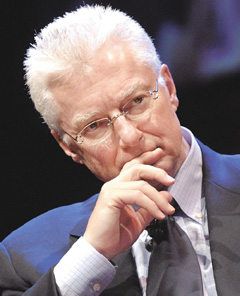
Posted by JD Hull at 10:59 AM | Comments (0)
May 25, 2010
Not a good day so far: The world's stock markets.
Global markets said to "swoon". To blame for today's plunge are Europe's debt crisis, its faltering banks (especially in Spain), way-low oil and metal prices, and an ultra-bold North Korea. Many expect the Dow to dip again below the 10,000 average. See AP, The Sydney Morning Herald and Reuters.
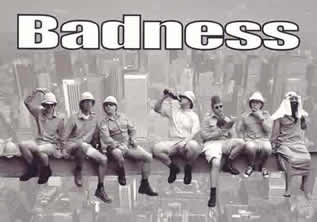
Posted by JD Hull at 11:59 PM | Comments (0)
May 24, 2010
The Senate's over-hyped overhaul.
And is 'shambolic' a real word? See The Economist's take on last week's Senate approval of the financial reform bill in "Almost There". Three excerpts:
The most important component aimed at preventing another crisis is “resolution authority”, under which any big financial company, not just a bank, can be seized and wound down in an orderly way. Lack of such authority led to the shambolic failure of Lehman Brothers and the controversial bail-out of AIG.
The new consumer-protection bureau should help to close the gap between well-regulated banks and poorly regulated mortgage brokers and finance companies, which led the race to the bottom in loan-underwriting standards. But many firms, most significantly small banks, are exempted from its authority.
...Some of banks’ biggest worries remain unresolved. They are resigned to accept some form of the “Volcker rule”, which would restrict their proprietary trading and investment in hedge funds and private equity.
Posted by Holden Oliver (Kitzbühel Desk) at 08:52 PM | Comments (0)
May 22, 2010
Penny from Evanston 1928
Posted by JD Hull at 11:34 PM | Comments (0)
Speaking of Club Ned: Time to man up, grow up, and go on record.
Our new digital culture permits a certain accepted wimpiness to masquerade as privacy and personal style. But anonymous writers are rarely worth your respect.
This blog does not publish anonymous comments.
Absent compelling reasons, nameless blogosphere participants, in our view, are rarely worth anyone's time, thought, or respect--even when they think and say brilliant things. Anonymous writers and commenters have already "discounted" themselves.
Above: The revered French Resistance in action 70 years ago. Today, certainly, these heroes might need to comment and blog anonymously. However, lawyers, shoe store managers, Tulane grad students, accountants, and other country club Charlies haven't earned that privilege.
They are second-class citizens. They generally say third-rate things. Certainly, they have no incentive to exceed below-average. Feel free to look down on them--and enjoy it.
It doesn't take much thought or courage to lob one in there when you don't sign your name. Our new digital culture permits a certain accepted wimpiness to masquerade as needed "privacy" and personal "style". But it's a ruse. Most of us can do better than that. Don't buy into nameless blogging and commenting (or participation through pseudonyms) unless it's deserved.
As Walter Lippmann once reminded us, "cowardice" is a strong word, and you don't throw it around. We dislike using it. It implies a certain moral superiority of the user (which the writers of this blog would never claim, and do not wish to achieve). It generally furthers no discussions, and justifiably puts people on the defensive. But that word, unfortunately, may fit here.
If you want evidence and examples, see the comments on any given day to posts at Above the Law, which enjoys a status as one of the most successful sites ever (in or out of the law).
Check out the anonymous haters, nameless "experts" and scores of prissy pundits who won't sign their real name to their rants and indictments. (We don't know how much David Lat is paying editor Elie Mystal these days, but it's not enough. Mystal is a mensch, soldier, hero and lightning rod who is often himself targeted for abuse.)
Club Ned Exemptions. "You sure do have a pretty mouth." Special needs exemptions, however, may be available to deserving applicants at this blog. Examples: Rape victims discussing being raped. CIA operatives talking about their jobs. Cuban, Iranian, Chinese dissidents. Abused housewives. Risk-takers and Radicals. Real victims. And those who have experienced a "high profile" humiliation--like Ned Beatty's character Bobby in "Deliverance".
Everyone else? (1) Get over yourself. (2) Get some help. (3) Or simply get back to work. You're just not ready for the bigs until you sign your real name to your real words.
Past posts on the subject are here and here.
Posted by Holden Oliver (Kitzbühel Desk) at 05:42 AM | Comments (0)
May 20, 2010
Main Street's May Day Times Square Wake-up Call: Did America listen this time?
Counterterrorism expert and D.C. lawyer Eric O'Neill, The Georgetown Group, on what the Times Square bombing attempt means.
We Yanks get the big hint? We note that this week's Newsweek and cover article about the May 1 Times Square bombing attempt hit the stands with a date of May 17. That's a long time. Did the first news of the Times Square misfire or fall flat with much of the establishment media and most Americans?
Just starting to sink in, maybe?
True, no one was hurt. Mainly because the bomber--Faisal Shahzad, a Westernized Pakistani--is a very young 30 and a world-class screw-up. Your average troubled, normally mild, and lackluster young American male who can't chew gum and do loyalty oaths at the same time. Moreover, the press may have unevenly or half-heartedly covered it simply because we have all been consumed with so much happening at once: the residuals of health policy wars, the Goldman Sachs hearings, mid-recession finger pointing, the BP spill off our southern shores.
Maybe Islamic terrorism is decentralized, domestic, and in your backyard? But Shahzad is also a U.S. citizen--and very unlikely to have been under the command-and-control protocols of any branch or level of mainstream Al Qaeda. He's obtained degrees in and lived in the U.S. Father and husband. Devout. And before things went bad for him personally, he even had a house in what would pass for Connecticut suburbs. There are certainly others like him we haven't met yet.
What does that mean for day to day life in America? Do we see malls, parking lots, and subway stops differently in the last three weeks? Probably not--but maybe we should. Are we suddenly in "mass denial" about what was precisely everyone's fears after 9-11?
A new kind of "homegrown" threat? In a short but compelling interview with Reuters last week, Eric O'Neill, both general counsel and chairman of D.C.-based The Georgetown Group, and often still in the news for his role (and subject of the movie "Breach") in taking down spy and FBI agent Robert Phillip Hanssen in February of 2001, came closer than anyone to both defining the problem and what's needed.
Listen to the above segment and O'Neill's comments, which begin at about 1:25.
Posted by JD Hull at 11:59 PM | Comments (0)
May 15, 2010
"Hey, is that an elected county judge in your pocket?"
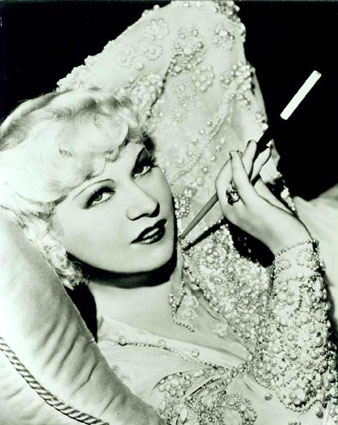
"Or are you just hugely happy to see me?"
Even when popularly-elected judges are "good"--and, to be fair, there are some great ones--state systems that support those regimes will never inspire much confidence. Each of those jurists is steeped a taint.
Think of it like this: Good Crops, Motherhood, the Flag, Andy Griffith, puppies, selflessness, courage (Mae West, above, had lots of it), beauty, truth, a thin Marie Osmond, Sweetness and Light, and replacing state judicial elections with merit-based selection in 39 American states. These are among the enduring and good things in life.
Lest anyone worry that writers at this site are developing tolerance for enduring but dumb ideas on hearing and deciding disputes, we will reach out and try here to be frank, forthright, and clear.
The popular election of state judges is beneath: (a) you, (b) your law firm, (c) your family's dog, and (d) especially your clients, and especially if you act for businesses who trade nationally or globally. That institution, favored in a vast majority of states in some form, makes the states that still conduct them appear insular and potentially unfair to both American litigants and to non-Americans and their businesses abroad.
With each election cycle campaign donations are driving up the costs. This is, of course, wasteful and inefficient. See "The New Politics of Judicial Elections in the Great Lakes States, 2000–2008" by Justice at Stake. More importantly, the very existence of state laws regulating campaign contributions to candidates running for judicial office send two unintended but lousy messages:
1. Judges, like mayors and congressmen, have "constituents".
2. Justice, like real estate or widgets, is "for sale".
We appreciate that many of the some 10,000 elected American judges were excellent lawyers, and that as jurists they do first-rate, honest, exemplary, and often inspiring work. We have indeed stayed loose and open-minded on this subject.
Certainly, we are not prejudiced. Three or four of our friends are retired elected state judges. We say hello to them in public--and once even had one to dinner. We would probably not object too strongly if one of our sons or daughters, our cook Opal, or Opal's brother Roman, the gardener, very briefly dated or had a short meaningless affair with one, maybe.
But elected benches are by nature glaringly "fishy" (i.e., "...Hey and dang, Earl, the campaign money to the judge those guys gave last year...just don't seem right...") to even the most casual observer in the Midwest or South, and wherever else American horse sense abounds.
Merit-based selection is not perfect. However, it has worked very well for two centuries in American federal courts with a minimum of bad appointments and embarrassments--even if you adjust for the fact that state judges outnumber federal judges (who are appointed for life) by a factor of over 10 to 1.
It's time for the States to grow up, and adopt systems of merit-based appointment....
So quick and dirty re: elected state judges and campaign money.
Since 1996, persistently, and for nine years before we started this blog, Hull McGuire has written about this issue. More recently, we've followed and written a lot on the U.S. Supreme Court case about a popularly elected state supreme court judge, and campaign money recipient, who failed to disqualify himself in arguably suspect circumstances.
In that closely-watched case, see slip opinion in Caperton v. Massey Coal Company (June 8, 2009), the Court ruled last year that a West Virginia judge should indeed have disqualified himself from hearing an appeal of a $50 million jury verdict against an a coal company because its CEO had been a major campaign donor.
So the popular election of state judges--permitted in some aspect in a clear majority of the states--gives the appearance of justice being "for sale." Elected judges can be especially "bad" for good clients who do business all over the U.S. and the world. Even when elected judges are "good"--and, to be fair, there are some great ones--state systems of popularly-elected judiciary will never inspire much confidence.
Popularly elected jurists who hear and decide business disputes are steeped in a taint.
The point: Judges should not have "constituents," i.e. law firms, and their clients, who make campaign contributions. Right now, in most American states, they do. And there is no way to dress that up.
Generally county-based, American litigation at a state level is already frustratingly local and provincial for "outsider defendants"--businesses from other U.S. states and other nations sued in local state courts--who cannot remove to federal courts, the forums where federal judges can and should protect them from local prejudice.*
American states that still hang on to electoral systems look increasingly provincial, classless, and silly from a global perspective. Merit selection is not perfect--and also poses risks--but it is far better than what most American states currently have in place. It's time for American states to grow up. See our many past posts over the last four years on this subject in our category on the right side of this site: Federal Courts.
*One reason that federal diversity jurisdiction was created in the first place was because of the framers’ concern that prejudices of state judges toward out-of-state persons would unfairly affect outcomes in trial courts. Erwin Griswold, Law and Lawyers in the United States, 65 (Cambridge, Harv. Press 1964). Over 200 years later, our current systems in the states make that local prejudice almost inevitable. See also, the interview of General Electric's Mike McIlwrath in July 2009 of Prof. Geoffrey Hazard of Hastings Law School, who addresses why European business really fear U.S. state courts.
Posted by JD Hull at 12:47 AM | Comments (0)
May 13, 2010
NYC: You still feel like a religion.
"What of the cripple who hates dancers?"
-- جبران خليل جبران بن ميکائيل بن سعد
For all the hassles, if you live in or around around Manhattan, be grateful. You are daily taxed, stretched and tested. It's grow or die. But most New Yorkers more than survive. Smaller U.S. towns--the majority that shed their old skins in pain and slow motion--secretly envy New York City every moment.
Posted by Holden Oliver (Kitzbühel Desk) at 12:59 AM | Comments (0)
May 12, 2010
Tan, ready, and re-launched in Europe
A fine real-time resource on the European Court of Justice. About a month ago, in Utrecht, The Netherlands, Allard Knook re-launched his ECJBlog, where he covers the European Court of Justice in Luxembourg. It's even better than before. We do love the Dutch, as among other things, so many of them speak and write English beautifully. And especially in Amsterdam. But what's going on lately, with the men and women--okay, maybe just the men--of Amsterdam?
This wonderful city's women, in particular, do speak English (British or American) exceptionally well. Moreover, they are stunningly attractive, ultra-Nordic, very tall, energetic, confident and smart. Recently, however, Amsterdam's men--as a Brussels-based lawyer we know remarked last week--do "tend to look and act very much like, well, Moby." We have our reasons not to complain. Just curious. But it does seems to be deliberate and cultivated. What gives?

Name's Kleef. Buy you a Grolsch?
Posted by JD Hull at 11:59 PM | Comments (1)
May 11, 2010
A Man in Full: Duncan Campbell King

It is only through work and strife that either nation or individual moves on to greatness. The great man is always the man of mighty effort, and usually the man whom grinding need has trained to mighty effort.
--D.C. King, quoting Teddy Roosevelt, in a speech about U.S. Grant, Galena, Illinois, April 27, 1900*
No, no, he's not from Pittsburgh--too small, frail and well-read--but damn good guess. We admire Albion's new star Duncan Campbell King at Wrath of a Sumo King. Not just because he has given up all hope of ever behaving normally--and raised that to an art form. "I am Duncan Phebus Sumo Mercutius Steerpike Campbell King, Litigator Extraordinaire, and I do not want you to like me." But there's more, and a method here.
Yes, venting, sporting women and an American style "First Amendment" focus--but an un-conflicted, non-double standard one--are the main events. Like in olden days before we liberals ruined our speech and children with PC agendas--so your boys could grow up to sound like Mr. Rogers, Liberace, or maybe your great-grandmother in St. Cloud.
But through all his Triple-X venting on these subjects we also detect a great caring about quality, hard work, truth, beauty. Duncan is hereby given a Club Ned anonymity pass/exemption for life. Grounds: authentic, experimental, un-PC and feral.
Rise, Sir Duncan. Try not to maim anyone on the way out.
*Nota bene King's dictum to TeleTubbies, Teacups, Slackoisie, other New Age Looters: "Contrary to the horrific woolly bullshit you are fed it is a tough, competitive world."
Posted by Holden Oliver (Kitzbühel Desk) at 09:35 PM | Comments (2)
May 10, 2010
Nominee Kagan
The hearings start in about 6 weeks. The better coverage is at The Washington Post. Kagan, 50, and in most respects the perfect candidate, will win--but with a huge fight, featuring her strident 2004 "moral high road" (our term) dissing of military recruiters at HLS. See, e.g., The Dailey Caller.

Elena Kagan
Posted by Holden Oliver (Kitzbühel Desk) at 11:38 PM | Comments (0)
May 09, 2010
The man who found proof of lame lawyer habits.
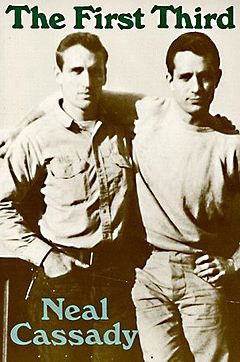
Stand-Up Guys: Ernie (left), a dead-ringer for 1950s icon Neal Cassady, and WAP, during their pre-lawyer Beat years at Nathan's, a D.C. saloon for older players until July of 2009. Washington Examiner called on Nathans "a well-stocked, man’s bar, though the men brought lovely women."
Sir Ernie of Glen Burnie. Lawyers who won't take a stand is a time-honored tradition. Our hero, Ernie from Glen Burnie, who is not such a lawyer, is a life-long friend. He'll stand up for people who pay him--and people he just met on the subway.
It's his nature.
He stands up.
Ernie's "available" and "comes to play". He will tell you what he thinks. He will act. He is a trial lawyer with business sense.
Ernie played football for one of the Ivies. He thinks in terms of both collaboration and getting things done. He's smart but friendly. Guys' guy. Ladies' man. Lawyer's lawyer. Renaissance Human. Charmer. Playful rogue. A reveler in words.
He's a partner in a well-known DC law firm. (He does exist.)
He does not like "cookie cutter" thinking or people. If you need him, he's there. You don't have to ask.
Standing up for friends? "A pretty easy standard, and a no-brainer," he once told us. Stand up for friends, sure--but also for humans who need or deserve it. Do it for free.
Things you and your co-workers and friends have to think about for a long while? Ernie just does them. He always has--since grade school. Instinct. On gut. He never hesitates.
Even though he does securities litigation, if you are a GC, you can call him in the middle of the night with your insider-trading problem, or report that your kid at Dartmouth just thrashed a waiter and both Hanover cops.
He's very well-paid, our Ernie. But if you--you are an associate, client, paralegal, receptionist, messenger, street person--want, say, a cup of coffee, he does this amazing thing: he just gets you a cup of coffee. Just because. What a character.
And, best of all, as the Foggy Bottom, West End, M Street and Glover Park crowd will tell you, when he's not working, he's the kind of guy who never hits on married women over 40.
You can read Ernie's story--it's about an old parchment he claims was discovered in Alexandria, Virginia around the same time we both began practicing law in The District--at "The Seven Habits of Highly Useless Corporate Lawyers". This is a true story, mostly. So listen up.
Posted by JD Hull at 12:59 AM | Comments (0)
May 07, 2010
UK wakes up to hung Parliament.
See AP for what happened and The Guardian for what it means.
Posted by Holden Oliver (Kitzbühel Desk) at 11:59 PM | Comments (3)
May 05, 2010
Nashville: The Big Moxie
Tennessee is the Volunteer State. Nashville Business Journal: How businesses are helping. The Tennessean: Obama. BBC coverage.

Southern moxie: The Grand Ole Opry? It just moves across town.
Posted by Holden Oliver (Kitzbühel Desk) at 12:59 AM | Comments (0)
The EU, the Euro and the Greek debt bail-out.
As actor Bill Murray might note while hunting shades and bogeymen in Manhattan, here's something you don't see every day. For starters, see "Debt Jitters Hit European Markets" at WSJ and "Acropolis Now" at The Economist.

Posted by Holden Oliver (Kitzbühel Desk) at 12:00 AM | Comments (0)
May 04, 2010
Running dog Yankee Mr. Oliver want fries with this?
Hooters restaurants in China? Say it ain't so, Joe. Los Angeles Times: Hooters Underscores Mixed Sexual Messages in China. Maybe Greater China lawyer Dan Harris would weigh in? Mr. Harris, you speaking to us these days? Lord knows no one else is. Anyone? Please yes to have picture taken with the American Mister Dane Hool. We meet once on Sint Jacobsstraat in Amsterdam. Fun guy. Way cool. Click-click.

Chairman Coby: To Get Rich on Hooters in China is Glorious.
Posted by Holden Oliver (Kitzbühel Desk) at 11:59 PM | Comments (4)
The Rules
Four years ago, we put this blog and the firm behind it at considerable risk of being known as the lawyer-authors of a genre how-to book, i.e., "Who Moved My Bates-Stamp?". We completed writing The Rules of Client Service. There are (gulp) 12 of them. They derive from an irreverent and pithy office guide for associates we wrote in 1997. They are based on actual experience over many years. We've more than given them a whirl. The rules work with the most sophisticated users of legal services on earth. If you scroll down a little, they are also on your left in this blog's side panel.
Posted by Holden Oliver (Kitzbühel Desk) at 11:49 PM | Comments (0)
Solo, Small, Medium, Muscle Boutique or 3000+
Lawyer: "We're your friends. We're not like the others."
Duke: "No more of that talk, or I'll..."
--From first chapter of famous post-Kerouac road novel
How often does a magazine 10 months old help you do anything? Here are some fine resources for the washed, unwashed, in-between, employed, unemployed, underemployed, elites, profs, geeks, minders, finders, grinders and generic law cattle: "50 Web Resources for the Suddenly Solo Lawyer" by Jim Calloway and Allison Shields in the July 2009 edition of Law Practice Today. Caution re: the stuff on stress management: If you really need to get smarter on that, maybe you signed up for the wrong post-graduate study. Law practice is stress. Our suggestion: Make stress your friend. Shake hands with Mr. Stress.
Posted by Holden Oliver (Kitzbühel Desk) at 01:07 AM | Comments (0)
May 03, 2010
UPDATED: E-gadgets, E-toys, E-illusions: Making-us-dumb?
A new woodworking tool, in the hands of a master, makes the master more than he was before. In the hands of a fool, it makes the person more foolish.
--Patrick J. Lamb, Chicago trial lawyer, storied Irish-American, business law visionary, master woodworker.
We think the answer is--generally--yes. We've noticed that people keep mistaking their laptops and Smartphones for their brain. Rather than make work easier, e-tools may raise the bar for using your brain.
If e-tools and e-gadgets allow you to do better problem-solving, that may be because they help "open up" and expose the problem you are working on. In other words, the tools--from multiple regression analysis programs to WestlawNext and Lexis to Google Scholar and more--may reveal a different problem: more nuanced and complex, deeper, even bigger.
Now solving the problem will take more time than if you hadn't used them in the first place. There is more of, in and to your problem to sift through and analyze--but you are much, much better off. Good news: you have a bigger and better picture. Those e-tools work great. The bad news: there is more work to do.
That vast arsenal of Digital Tools. They just made your problem a lot fancier--but easier to fathom, and way more clear, even elegantly clear. Now start using your brain (and your e-tools, too) on the problem again. But don't tell us you were done the first time through. You're weren't.

Writer-lawyer-Renaissance man
Peter Friedman in a good mood.
So e-tools don't make you (a) smarter or (b) faster. Neither. And maybe just the opposite, especially if you think:
"Hey. Wait a minute. Complex problem-solving no longer requires anyone's energy, time, sweat, or full participation. Everyone's smart now. We have these tools."
Or if you just figure:
"Besides, this stuff at least makes me look smart. That should do it, right? If the going gets tough, there's always the Google search. No worries. Pass the Cheetos, please."
But we hadn't thought about PowerPoint as making-us-dumb before. Maybe we didn't want to.
We've been honest about everyone's struggle (including ours) with the actual utility of All That Tech out there. What really works? How much is overdone, silly or a numbing distraction? And, most importantly, do we know how to use it to get anywhere. See "Wanted: Improved, higher-functioning, digitally-competent Boomers".
With Tech, as with anything else, we put on no airs at this blog--or in our firm's practice--and either should you, about hard things we are all trying these days to get right.
Get over yourself. You're probably dropping the ball with Tech. (We all are.) No matter who you are, Tech poses lots of problems--sometimes very different ones--for people of all professions, ages and cultures. See, and for fun, "Reviewing E-mail: Are you lawyering or typing?".
To its credit, Powerpoint, the popular Microsoft product, over 25 years old and significantly improved in 1996, is still useful in Hull McGuire meetings, litigation and pitches--provided that, like other digital tools, it does not become the main event. But sure, PowerPoint's a flat-out keeper. Besides, and see above, it's something we can handle.
Cleveland-based lawyer Peter Friedman and others have thought about PowerPoint making-you-dumb, or at least rendering you or your audience far less effective. Friedman's a Case Western Law associate professor, visiting law prof in Detroit and Canada, former practicing lawyer (and, no, he's not a prof who gave it the old Siwash try of a full 18 months), former NYC law firm partner, litigator, and friend and fellow Buckeye who writes, among other places, at Geniocity.
Peter Friedman thinks that "PowerPoint might make you dumb, but understanding why can help keep you from being dumb even when you don’t use PowerPoint".
Got that? Read Friedman's piece. You'll appreciate the title even more. Excerpts:
It reminds me of my students when, in response to feedback they don't like, come to me with their work and argue that they really did include in their writing the important points I've said they've neglected.
They even can point me to the words that I can see they really did mean to make those points. But those points are either expressed in language that is too obscure or are put in places in which they do not fit....
All of us have those moments when we believe we have expressed our opinion on a subject effectively, but if that if that opinion is unconnected to the evidence, authority, and reasoning that supports it, if it is buried in words that don't support that opinion, or if in any other way its truth is obscured, it might as well not even be there.
Posted by JD Hull at 12:55 AM | Comments (0)
Renewal, rebirth, tool sharpening.
Spring ushers in important observances by most cultures and religions.
Nearly everyone--Pagans, atheists, druids, Scots, Picts, regular people, animals, your oddest relatives, city people, and the most pale indoor white collars you know--notice the natural world more. Even plain honest fleshy folk we grew up with in the American Midwest: they do a move, a dance, a jig, or an inspired stylish waddle to celebrate.
It's only primal. We all refuse to ignore rebirth, renewal, new life cycles, being here now--and the possibilities of bold fresh starts.
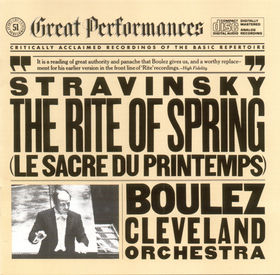
Posted by Holden Oliver (Kitzbühel Desk) at 12:00 AM | Comments (0)